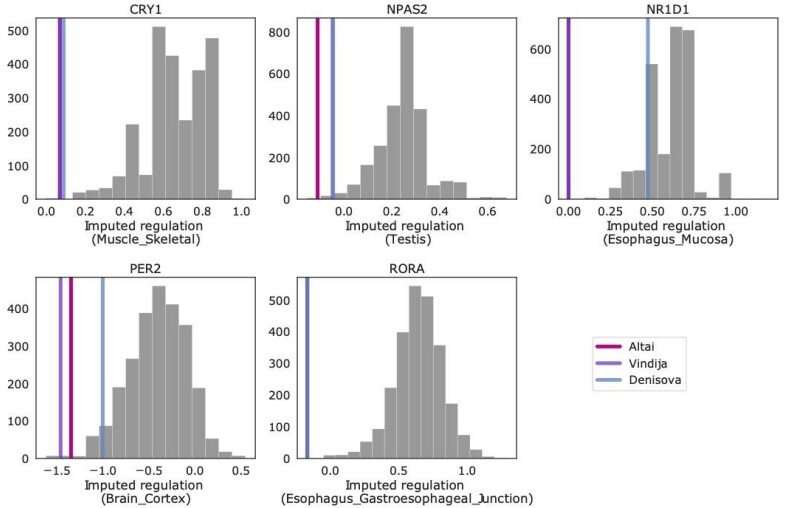Many circadian genes are divergently regulated between modern humans and archaic hominins.
Comparison of the imputed regulation of core circadian genes between 2,504 humans in 1,000 Genomes Phase 3 (gray bars) and three archaic individuals (vertical lines).
For each core circadian gene, the tissue with the lowest average P-value for archaic difference from humans is plotted. Archaic gene regulation is at the extremes of the human distribution for several core genes: CRY1, PER2, NPAS2, NR1D1 RORA.
Credit: (2023). DOI: 10.1101/2023.02.03.527061
A team of epidemiologists and geneticists from Vanderbilt University, the University of Pennsylvania and the University of California has found evidence that suggests modern humans mating with Neanderthals may have gained an ability to adapt to differences in the amount of daylight hours in Eurasia.
The group studied Neanderthal genes left in the human genome while looking for those that might impact the circadian rhythm, and found several that suggested mating with Neanderthal natives might have benefited newly arriving humans in ways that have not been known before. Their work has been published on the bioRxiv preprint server.
Prior research has shown that ancestors of Neanderthals arrived in Eurasia before modern humans. Those that adapted to the vastly different environment (compared to Africa) survived, while those that did not perished. One such adaptation would have been changes to the circadian rhythm to align with changes in seasons and the associated length of days.
As the Neanderthals persisted, their genomes would have evolved to allow them to live in places where days could grow very short and cold at times, and hot and long at others. Later, as the ancestors of modern humans began arriving in Eurasia, some of them procreated with the Neanderthals already living there. Researchers believe that some of the Neanderthal genome that was related to adapting to a Eurasian environment joined with the modern human genome, allowing human offspring to better deal with the environment in which they were born.
In this new study, the research group sought evidence of adaptations by the Neanderthal that helped them survive in Eurasia, and further evidence that they passed along some of those genes to modern humans. They found 28 identifiable circadian genes in the Neanderthal pool and 16 circadian genes that had been passed on to modern humans. In the second set of genes, they found that the shift in the circadian rhythm in the modern human recipients moved in the same direction, pushing them to become morning people.
Recommend this post and follow
The birth of modern Man


No comments:
Post a Comment
Stick to the subject, NO religion, or Party politics